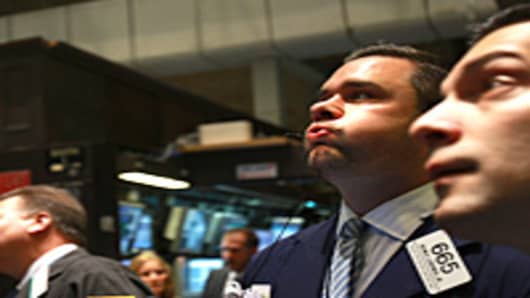Stock investors Friday say goodbye to the worst quarter since the depths of the financial crisis, but the searing volatility that led to the third quarter's 12 percent decline is likely to continue.
Markets will grapple in the fourth quarter with the same issues that drove stocks lower in the third quarter — fears that Europe's sovereign debt crisis will tip an already weak economy into recession, and that it could also spur a banking crisis. Then there's the U.S. deficit talks, bound to generate more political strife as a bipartisan Congressional committee works up recommendations to pare the deficit by a late November deadline.
"We think we'll be bouncing around here for a few months until we get later into the year and maybe early next year. I think the idea of getting to that (S&P 500) 1,300 range are probably diminished as along as the market's eyeball is on what's happening abroad," said Stuart Freeman, chief equity strategist at Wells Fargo Advisors. Freeman has a target of 1,250 and 1,300 for year end.
The S&P 500 is down 12.1 percent for the third quarter, its biggest quarterly loss since fourth quarter, 2008 when it was down more than 22 percent. The Dow, up 143 Thursday at 11,153, has lost 10.2 percent for the quarter, its first negative quarter since the second quarter of 2010 and its biggest drop since the height of the financial crisis in first quarter, 2009.
What to Watch
A key piece of third quarter data is expected on its final day — personal income and consumption data at 8:30 a.m. ET. The release also includes the Personal Consumption Expenditure Deflator or PCE/deflator, an inflation measure closely watched by the Fed.
"Getting the August data for consumption is really a big step in terms of trying to put together a third quarter GDP estimate," said Stephen Stanley, chief economist at Pierpont Securities. He expects a 0.2 percent increase in spending in August, well below July's 0.8 percent.
"It's interesting given all the gloom and doom around. You want to be pushing your (GDP) number down, but every time a number comes out that's relative to GDP, it's pushing me in the other direction. I'm now at 2.75 from 2.5 (percent)," for third quarter GDP, he said. Revisions to second quarter GDP, released Thursday, showed the economy grew at an annualized rate of 1.3 percent, up from the previous 1 percent.
Other economic reports Friday include Chicago purchasing managers, at 9:45 a.m., and consumer sentiment, at 9:55 a.m. St. Louis Fed President James Bullard speak at 11 a.m. in San Diego.
In Europe, Germany's upper house, the Bundesrat, votes on enhancing the powers of the EFSF bailout fund. Germany's lower house voted its approval on the European Financial Stability Facility on Thursday. The Austrian government also votes Friday.
French President Nicolas Sarkozy meets Greek Prime Minister George Papandreou in Paris.
The Bank of Spain holds a 5 a.m. press briefing. Friday is the the deadline for Spanish savings banks to boost capital ratios.
Markets Mayhem
Stocks Thursday were once more on a volatile course, making big moves in both directions. The S&P and Dow went from being sharply higher to negative, to higher again. Apple , for instance, finished the day at $390.57, but not before rising above $402 and falling to a low of $386. (Apple was the third best performer in the S&P in the third quarter, gaining 16.4 percent.)
The Nasdaq , at one point Thursday, saw a more than 50 point loss, but it finished the day down just 10 at 2480, while the S&P 500 ended up 9 points at 1160.
"As opposed to a day where we know we have liquidation selling, like last Thursday when everything was down the same percent, today we had sector rotation. The worst performers were technology and consumer discretionary. Utilities are the top performer," said Art Hogan of Lazard Capital Markets.
Big losers on the day were momentum stocks, some with news stories affecting them and others without, as some investors cleared them off their books ahead of quarter end.
Chinese internet stocks Baidu and Youku.com were sharply lower on concerns of a Chinese slowdown. They were also hit after a report by Reuters quoted Robert Khuzami, director of enforcement at the SEC, as saying the Justice Department is looking into accounting irregularities at Chinese companies listed on U.S. exchanges. He did not identify the companies.
Netflix , down 11 percent, was another momentum casualty, falling on concerns competitors, like Amazon.com , will hurt its business. "They outperform to the upside so by the laws of gravity, they have to outperform to the downside," said Hogan.
GFT Forex's Boris Schlossberg said Fitch's downgrade of New Zealand created some mid afternoon excitement in the foreign exchange market. "You saw the 30-year (Treasury bond) went below 3 percent, you saw the Aussie (dollar) melt down and the euro dropped," as the New Zealand dollar slid.
Fitch downgraded New Zealand by one notch to AA from AA-plus on concern about its growing external debt.



